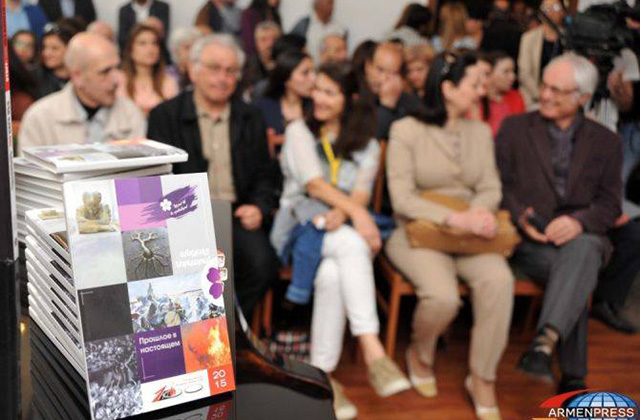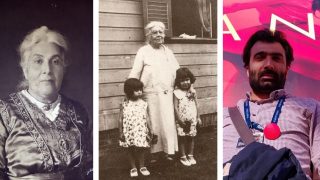
We Defeated the Enemy with our Silence as well, Only by the Fact that We Exist, and that They Failed to Destroy Us: Hasmik Papian

The Charents Museum of Literature and Arts has published an illustrated book with the same title summing up the results of the “Response after 100 years” project, participants of which were well-known intellectuals from Armenia and Diaspora.
The illustrated book includes 10 letters written in the years of the Armenian Genocide, which had remained unanswered, responses to these letters after 100 years from famous Armenian and foreign officials: letters, paintings, exclusive works and archival photographs.
In an interview with reporters Hasmik Hakhverdyan, project coordinator, said there are lots of unpublished materials, which will be revelation for the readers, “The illustrated book contains exclusive correspondence of world-famous film director Anri Verno and Bülent Akarjal, the then Turkish Minister of Tourism, where the latter exchange thoughts on Armenian Genocide and Armenian Issue.
As written sources for the illustrated books served rich funds of the National Archives of Armenia, Museum of Literature and Arts, National Library of Armenia, in partnership with Artists’ Union of Armenia, Yerevan State Academy of Fine Arts, The Panos Terlemezyan State College of Fine Arts, “All the letters of well-known Armenian intellectuals written before the massacres, were taken from the fund of the Museum of Literature and Arts. Lot of edifice was provided by our compatriots from abroad. Ethnographer and folklorist Verzhine Svazlyan’s scientific work was greatly helpful as well.”
In the “Response after 100 years” illustrated book world-famous composer Tigran Mansurian, French-Armenian director Serge Avedikian, Vienna based Armenian soprano Hasmik Papian and others replied to unanswered letters of the 20th century intellectuals, who became Genocide victims.
Serge Avedikian comments his response to the letter of satirist Yervand Odian after a century, “It was touching and hard work, as when I was asked to reply one of the letters written in the period of the Genocide, I thought how one may reply to a letter 100 years later, which should remain without a reply. Maybe power of those letters was in the fact, that they were unanswered in our memories, however, it shout be mentioned that people of Armenia were inspired, were able to protect their language, and not be lost in history crossroads, therefore, also reply to intellectuals, who sent lots of messages, realizing they won’t get a response, moreover, maybe they would be massacred in a few hours. I replied to Yervand Odian as if I got a letter from a living person. I thought, a reply should be written linked to both our historical past and present. Maybe it was our obligation to respond what has happened to us 100 years later, to those, who gave their lives in the period of Genocide, without being defeated to their internal power,” the director said, refraining from the details of his reply.
Tigran Mansurian, world-famous composer, who responded to Garegin Khazhak, publicist, social and political figure, massacred in the days of 1915, said, “I have had the opportunity to keep the book in my hands, and now I must say a very crucial work was done—pure, beautiful, with good taste and saturated content, about human destiny, their contacts and liaison between them, which are rather capacious, especially throughout these recent days. Issues raised by this book are extremely contemporary, which have bothered all of us for 101 years. Sometimes, together with the beautiful, it’s important that the weapon worked as well, the direct weapon, not the one we sometimes consider arts to be, but the weapon of our army. They should function proportionally, as biography and fate of our people in the civilized world is adding the portion of the kind, however, life has showed that it’s not enough, we should also have weapon to protect it. Unfortunately, we start the 101st year of Genocide again full of wrinkles and question marks. At least we have statehood now and clear consciousness, that we should maintain our language, our church, our spirit, a cultural wealth, in which we are now.”
Famous Armenian soprano Hasmik Papian was also present, who, touching upon the idea of creation of the illustrated book, said, “I’m a child of survived parents, accordingly this topic is always with me, in my blood. From last year I participated in many commemoration events, and came to the conclusion that I’m very glad that we are alive now, and continue our mission as a book publisher, creator of art and culture and encourager. Our biggest “failure”, which our “neighbor” wouldn’t understand, in many cases isn’t realized by the civilized world as well. We should continue our mission, and I’m sure, all our victories are before us. We defeated our enemy with our silence, only by the fact, that we are alive and they weren’t able to destroy us. ”
The illustrated book has been published owing to the support of the RA Ministry of Culture, the State Committee coordinating the commemoration events dedicated to the 100th anniversary of the Armenian Genocide and VivaCell-MTS.
Then appreciation letters were awarded to the participants of the “Response after 100 years” project, followed by the screening of the film “We will come”. On the same day, the exhibition of the graphic works picturing Western Armenia that have been chosen and included in the “Response after 100 years” took place.
By Nvard Manvelyan























